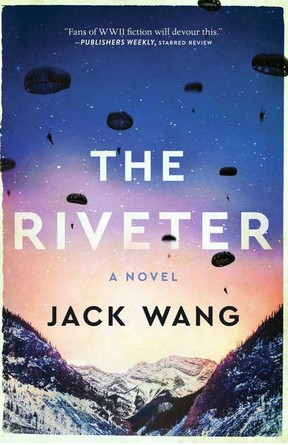Real-life hero inspires war novel The Riveter

Reviews and recommendations are unbiased and products are independently selected. Postmedia may earn an affiliate commission from purchases made through links on this page.
Enjoy the latest local, national and international news.
- Exclusive articles by Conrad Black, Barbara Kay and others. Plus, special edition NP Platformed and First Reading newsletters and virtual events.
- Unlimited online access to National Post.
- National Post ePaper, an electronic replica of the print edition to view on any device, share and comment on.
- Daily puzzles including the New York Times Crossword.
- Support local journalism.
Enjoy the latest local, national and international news.
- Exclusive articles by Conrad Black, Barbara Kay and others. Plus, special edition NP Platformed and First Reading newsletters and virtual events.
- Unlimited online access to National Post.
- National Post ePaper, an electronic replica of the print edition to view on any device, share and comment on.
- Daily puzzles including the New York Times Crossword.
- Support local journalism.
Create an account or sign in to continue with your reading experience.
- Access articles from across Canada with one account.
- Share your thoughts and join the conversation in the comments.
- Enjoy additional articles per month.
- Get email updates from your favourite authors.
Create an account or sign in to continue with your reading experience.
- Access articles from across Canada with one account
- Share your thoughts and join the conversation in the comments
- Enjoy additional articles per month
- Get email updates from your favourite authors
“The jump master ordered the men to hook up, and they clipped their static lines to the cable that ran the length of the cabin … The sky began to fill with bursting black clouds of aircraft fire … The plane jounced and pieces of shrapnel tore through the cabin through the tender membranes of the floor and cabin … But somehow no one was hit. In the carnival of chance that was war, their luck was holding.”
This is high-altitude drama, and you’re thrown into it mere paragraphs into Jack Wang’s debut novel, The Riveter. The year is 1944 and we’re in the company of Canadian paratroopers about to jump to possible doom during the Allied liberation of Europe.
In the pages that follow, the tension doesn’t slacken. Neither does the documentary quality of the writing with its “I was there” authenticity. The book’s 53-year-old author confirms that recreating these moments in history posed enormous challenges. But after learning about a forgotten Canadian war hero named Richard Mar, Jack Wang knew this was a novel he had to write. His own Chinese-Canadian heritage compelled him to do so.
“The novel’s purpose is to dramatize the experience of one man who is fighting for acceptance from the only country he has ever known,” Wang explains. The historical Richard Mar was the only Chinese Canadian to serve with the revered First Canadian Parachute Battalion in the Second World War, and he became the inspiration for the rugged hero of this new novel.
Josiah Chang, a strapping young lumberjack from British Columbia’s Caribou region, is anxious to serve his country in the war against fascism but is initially barred from the military because of his heritage. It is only through dogged perseverance and a belief in his own self worth that he finally manages to enlist and eventually find himself parachuting into Normandy on D Day.
The historical Richard Bar’s name appears in Marjorie Wong’s book, The Dragon And The Maple Leaf: Chinese Canadians in World War ll. This volume sought to provide a brief history of every Chinese Canadian who had served in battle — and triggered Jack Wang’s own creative imagination. “At one point I had imagined dramatizing the exploits of a number of Chinese Canadians from that book,” Wang says now. “Their stories were fascinating to me. But I eventually decided to focus on one storyline.”

Wang was already an award-winning short story writer when he decided to embark on his first novel, a work whose lacerating wartime chapters merit comparison with such other Canadian classics of battle as Hugh Garner’s Storm Below, Lionel Shapiro’s The Sixth Of June, and Edward F. Meade’s Remember Me. But with this book, the 52-year-old Wang has more on his mind than the simply the fields of sacrifice. He wants modern readers to understand how it was for Chinese Canadians all those decades ago.
“You have to remember that before the Second World War, there wasn’t Canadian citizenship per se.” Wang is on the phone from upper-state New York where he is a professor in the Department of Writing at Ithaca College. “Canadians were still British subjects, but Chinese Canadians, with rare exceptions, couldn’t be British subjects. After the Chinese Immigrant Act of 1923, also known as the Chinese Exclusion Act, all Canadians of Chinese descent — regardless of how long they’d been in the country — had to carry a certificate of registration stating that they didn’t necessarily have legal status in Canada and could be considered a resident alien.”
National Post





